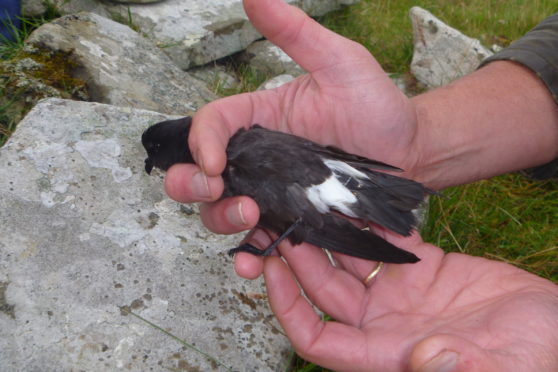
New research has seen GPS tags used to collect the movements of UK’s tiniest seabird over several years.
Scientists have used the technology to discover the storm petrel regularly travels up to 186 miles (300km) to feed in the stormy waters off Shetland.
The species is the UK’s smallest seabird, weighing just 25-30 grams – the same as three £1 coins.
Alex Kinninmonth, head of marine policy at RSPB Scotland, said: “Embracing this game-changing technology has allowed us to build a more complete picture of the lives of these elusive birds.
“Without it, any attempt to identify locations for conservation action or to assess the potential threats to the storm petrels from this important colony would have overlooked these key places.
“Scotland’s seabirds are already in trouble and face an uncertain future, so expanding our knowledge of where they go at sea and why is vital to give them a fighting chance against ever-increasing human-made pressures.
“New findings such as these must be heeded by governments as they regulate activity at sea if we are to see a reversal of downward trends.”
Researchers expected birds to use waters at the edge of the continental shelf to the west of Shetland, where high concentrations of storm petrels have been reported in previous decades from boat surveys.
However, the study found that the birds concentrated on two main unexpected sites.
One was 68 miles (110km) to the south of the colony and probably represented the areas that the birds used for feeding.
The other high concentration of birds occurred in the waters surrounding the colony and reflected the commuting flights of the birds to and from their nests at night.
A total of 42 individuals were tracked over four breeding seasons with foraging trips lasting between one and three days – generally ranging up to 186 miles (300km) from the colony.
One bird travelled almost 248 miles (40km) to the Norwegian coast.
Researchers think it was blown off course in a storm, but the bird returned to the nest in just 24 hours.
It is thought that the nocturnal habits of the birds have meant that past surveys have missed their reliance on inshore waters.

Enjoy the convenience of having The Sunday Post delivered as a digital ePaper straight to your smartphone, tablet or computer.
Subscribe for only £5.49 a month and enjoy all the benefits of the printed paper as a digital replica.
Subscribe